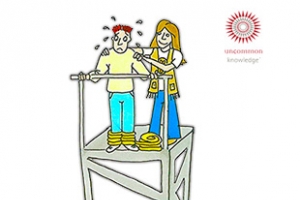Dealing with a Fear of Death
5 life-affirming ways to stop irrational fear of death spoiling your life
 "Is a fear of death lurking at the back of your mind?" courtesy of yives
"Is a fear of death lurking at the back of your mind?" courtesy of yives"I'm not afraid of dying; I just don't want to be there when it happens." ~ Woody Allen
"Fear of death. I forget about it sometimes; I might be at a party or having dinner with friends, and then it hits me all over again. I'm going to die! I don't know when, but I do know it will happen sometime. One day I won't be here, none of us will. I feel frightened, sad, and immediately stop enjoying myself - what's the point because I'll be dead one day anyway!
It happens at night sometimes, too - I become acutely aware, not just a thought, but a strong feeling that one day I'll be gone... forever. I just want to forget about it like other people seem to do; after all, I'm young and, as far as I know, healthy..."
Natural fear of death - such as any of us would experience if, say, confronted by an axe-wielding maniac or an aggressive illness - had for Gillian become an obsession, something that ate into, chewed up, and spat out her good times and kept her awake at nights. Fear of death (also known as Necrophobia) had made her a "suitable case for treatment". And so I was treating her.
Does fear of death drive all we do?
Some say that much of human behaviour, from watching unreal 'reality TV' to novel writing, cake baking, mountain climbing, and empire building, is just 'displacement activity' - mass distractions used to fend off awareness of our own inevitable non-being. Actually, I reckon some people don't really know they're going to die; oh, they 'know', all right - but they don't 'know'. Death can seem unreal until it actually approaches us.
"What's the point of thinking about it? There's nothing you can do!"
Too right! But for some, it's all they can think about. It becomes obsessive.
The following strategies helped Gillian relax and start enjoying life again; so, please, let them help you, too.
1) Use fear of death (or at least awareness of it) to help you live
Once upon a time, a man set out on a sea voyage with many others. It got rougher and rougher, until a ferocious storm threatened to upend the ship and send it spiralling into the depths. Everyone on board was beyond terrified - except this one man who just sat passively and seemingly at ease with the situation. At last, when it became clear the storm was abating, a group approached the man and asked him: "How could you remain so calm when we were only a second away from possible death?"
The man eyed them evenly and replied: "When is it ever different in life?"
Of course we all shall, one day, join the ever-expanding ranks of the 'silent majority'. And anyone with any imagination can sometimes suddenly be struck by the reality that their life is finite; there will, one day, be a whacking great full stop. But a morbid fear of death stops us living - and that's the problem. As they say: "You're a long time dead, so...live!" Awareness of death can be used to bring positive action to our lives and incite us to act decisively sometimes.
We live in a sanitized world that masks death whilst seeming to portray life as eternal. Death? Not for our generation! We're different; surely we'll buck the trend and live forever!
Death in western culture has become taboo - something that shouldn't really happen, almost like a personal failing. Laziness, fear to act, and pettiness can all be countered by sometimes reflecting on our own transience. But of course to do this effectively, we need to calm right down around thoughts of our own demise.
2) Look for triggers
Talking with Gillian, I learned that there were triggers - times in which fear of death crept up, pounced, and seemed to overwhelm her.
"How long has it been like this?" I asked her gently.
"I got worse when my gran died!"
Often, a morbid fear of (and preoccupation with) death is prompted by either witnessing death or being bereaved - especially if the loss is sudden and unexpected. One eleven-year-old child I worked with developed an overwhelming fear of death after the family cat had died.
Where did it start? Do you remember? Perhaps you're still troubled by whatever caused the fear and once any traumatic feelings subside, the fear of death will also recede. If you suspect you're still suffering the effects of the death of someone, seek the help of a suitable trained professional; someone who knows how to deal with trauma comfortably and quickly. Gillian noticed that she'd become preoccupied with death after periods of stress. I helped her better deal with the stresses in her life, and the happy ripple effect was that she now dwells less on the 'great inevitable' and has really started enjoying the 'time in the sun'.
3) Calm right down
Ever noticed how the more you try not to think about something, the more you do? I never advise people to "try not to think about it", especially when it comes to fear of death. Instead, get into the habit of relaxing deeply whilst briefly considering the fact we all go some day. Because it's not so much what we think about, but how we feel when we think about it. Feeling differently when thinking of something will help you to feel differently about it in future. This happens when anyone with any type of phobia takes time to actually think about what they're phobic of whilst feeling relaxed. Doing this 'takes the charge out of the fear', even stopping it altogether.
So whilst listening to a relaxing hypnosis session or when relaxing in the bath, just notice what it's like to think about the fact we all die as you relax deeply. Incredibly soon, you'll notice that you'll just start to feel so much better about it.
4) Consider nature's compensations
When it comes time, it feels right. Death might not feel right now in the balmy midst of vitality and life, but nature has its compensations.
I know someone who was hit by a bullet. He tells me at the time, he didn't feel any pain. I've heard other people who've survived accident and injury describe the same thing. During life-threatening emergencies, nature helps you by putting you into a state of detachment. Reality seems to take on a dreamlike (sometimes even slow motion) quality. Like a psychological protective buffer helping us manage and live through the experience.
People close to death describe how it starts to feel right for them; if you live ninety years or suffer a long illness, death starts to feel much more a part of the natural cycle of things. Nature has its own way of helping us manage things when they arise. Remember this.
5) As you were, so will you become
Do you recall the billions of years before you were born? Any of it? Does the acorn fear to become the oak? The grub the coloured butterfly? Before you were here, did you fear to come into this world?
How will 'extinction' (if that's what awaits us) be different after you've lived than the experience was before you came into being? Really, I'm serious; how?
Reflect on this idea sometimes; let it grow within you and help you live as best you can.
Gillian was young, energetic, funny, and kind. Nature needs these qualities to help fulfil all of humankind's needs, not just the needs of a single being. Now she doesn't think about her own inevitable one-day death - or if she does, as she says: "It's when I choose to reflect on the importance of living."






